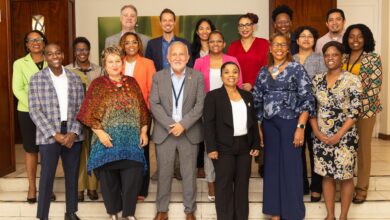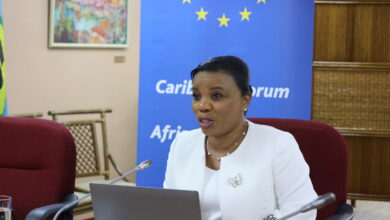(CARICOM Secretariat, Turkeyen, Greater Georgetown, Guyana) – Assistant Secretary-General for the Directorate of CARICOM Single Market and Trade, Ambassador Wayne McCook delivered remarks at the opening of the Caribbean Policy Development Centre’s Regional Policy Meeting on Tuesday 8 October 2024 at the Crane Resort in St. Philip Barbados, under the theme, “Envisioning Caribbean development over the next 50 years and the role that CARICOM intends to play.”
Please see the full remarks below:
At the outset I wish to recognise and thank the CPDC for its contributions and recognise the role of Civil Society in driving consequential policy discourse nationally, regionally, and globally. Indeed, the CARICOM Charter of Civil Society requires Member States to establish within their respective States a framework for genuine consultations among the social partners in order to reach common under-standings on and support for the objectives, contents and implementation of national economic and social programmes and their respective roles and responsibilities in good governance.
In this context, I am pleased to recognise that the CPDC enjoys direct access to the Highest Level of deliberation and policy making processes of CARICOM as an invitee to the Conference of Heads of Government for dedicated engagement. Other stakeholder groups such as the Caribbean Congress of Labour (CCL) and the CARICOM Private Sector Organisation (CPSO) engage the community extensively as Associate Institutions. Indeed, at the level of the Secretariat, tripartite approaches are being advanced, and structured engagement with Civil Society is being led by the Secretary-General through a dedicated focal point in her office.
So, I need not focus on the question of access because the channels of engagement are clear. Rather, let us have a conversation about impact!
Policy making whether at the governmental or the intergovernmental level has one central purpose – people! Policies must be developed and implemented for the betterment of the people on whose behalf they are made. So, it seems simple to assume that to make good policies, you begin by asking or discerning what are the needs of the people for whom policies are being developed, rules made, and programmes and projects implemented.
I have argued, that in the field for which I share some responsibility – trade policy and trade rulemaking – we should be guided by a demand driven approach – that is we should shape our policy proposals and define our negotiating objectives, strategies and positions on the basis of the demands of OUR stakeholders. For a demand driven approach to work stakeholders must speak and policymakers must listen. Of course, it is the task of experts and officials to apply their knowledge, experience, and expertise to these demands to ensure that they are viable, fair, and beneficial. If indeed, we negotiate for the things that our stakeholders have asked, when we deliver balanced and fair outcomes, there is unlikely to be a so-called implementation deficit because those who are to act are already signed on – it is their policy, their rule their agreement, they own it.
This approach places a great burden on all parties to do the hard work, to study, assess, analyse, deliberate, strategise and act.
So here we are today in a process that seeks to advance this goal of impactful engagement for the betterment of the stakeholders, the people of the Caribbean.
So, what is the context in which we meet today? We meet in a world in crisis not just in the shocks we face but in the seeming inability of our systems and institutions to address them. Conflicts rage, the existential threats of climate change are being manifested, debt and immiseration is the lot of far too many societies.
So, you could ask -what is the point!
Why gather here at the Crane to discuss the future of a Region that is open and vulnerable to so many shocks. Can we navigate in this global maelstrom or should we simply duck and cover?
That is the point!
Navigate we must – and to do so we must study, assess, analyse, deliberate, strategise and most importantly we must, after all of that, ensure that decisions are made, and action is taken to promote and protect the interests of the Caribbean People.
We cannot simply import solutions; we have to shape them ourselves!
I have been asked to “envision Caribbean developments over the next 50 years and the role that CARICOM intends to play”. I hesitate to offer a fulsome response to this question not the least because the pace of change today is so rapid and constant – punditry is often ill advised.
What is more important is answering the question – where are we now? and what can we reasonably expect to accomplish in the years to come. The truth is that after 50 years we know a lot about the Regional project and possibilities, and we do not need to imagine and speculate what the CARICOM toolbox will contain in the years to come. I posit that we will advance the approaches that we have developed as a community of sovereign states while constantly balancing our independence and our interdependence in the interest of the Community and its Members.
For all the concerns expressed about the dynamism, or lack of it, in Regional integration and cooperation, the truth is that our Region is taking action and has made considerable progress on both fronts.
So, let’s talk about Regional integration and cooperation in the context of the critical concerns of our citizens and our societies:
Peace and Security and Foreign Relations:
I wish to focus on a few examples of the Region’s effective cooperation on this issue in a multidimensional context:
First, within the Community –
While the complex challenges confronting Haiti persist, the glimmer of hope in a difficult situation in our most populous member state lies in a CARICOM supported Haitian led effort to find solutions. Solutions beginning in governance, with the establishment of a transitional government, complemented by ongoing efforts to advance security and stability which is so critical for the people of Haiti and our Region.
Our Region consistently champions the drive to ensure that the territorial integrity and sovereignty of our member states, in particular Guyana and Belize, are respected. We must not take the repeated declarations of the community for granted.
The Region has added crime and security as a pillar in the integration architecture and established key mechanisms to address this including the Council on Security and Law Enforcement (CONSLE), Caribbean Community (CARICOM) Implementation Agency for Crime and Security (IMPACS) and its related systems.
At the global level, our Member Guyana sits on the UNSC and continues a CARICOM tradition of ensuring that within our capacities we shoulder this important responsibility. The Community has a Permanent Observer at the UN in New York where the CARICOM Caucus remains a formidable coalition.
CARICOM‘s Leaders have never shirked the common responsibilities that the Community shares while respecting the sovereignty of each. They stand firm in their commitment to the principle of the Caribbean as a Zone of Peace and in the shared commitment to fairness, justice in all spheres. Our cooperation across global fora is guided by these tenets.
Trade and Economic Development
Trade and economic cooperation have been at the heart of the modern integration agenda from CARIFTA to the CSME.
There are a few things that we need to recognise in order to appreciate the state of Regional integration:
The Region set out its Regional integration agenda in a comprehensive and binding form – the Revised Treaty of Chaguaramas – which is the bedrock of Community law and part of the rulebook of each Member state. I invite all to frame discussions on the state of Regional integration and the single market and economy with the RTC as the basis. I urge you to recognise the goals that have been met and call out the ones that have not. Suggest new objectives, recommend new courses of action but contribute, contribute, contribute!
Removal of Restrictions
It is easy to forget that a key objective of the RTC (Chapter 3) was the requirement for the removal of restrictions to the Right of Establishment and the provision of services. This was completed by 2006. Any CARICOM national wishing to establish a business in another CSME Member or provide a service on a temporary basis can and must be able to do so as a right.
Free Movement
We sometimes forget that the Region already allows free movement of all citizens in accordance with the RTC and successive Decisions of the Conference which have led to free movement of skills in twelve categories. What is now before Heads is the shift from a free movement restricted by the designation of these categories to free movement for all. The Protocol to amend the Treaty to permit this is before Heads and is likely to include an opt out provision, a transition period and set out certain minimum rights that must be afforded to any national exercising the right of free movement.
Trade in Goods, including Agricultural Products
In terms of trade in goods, including trade in agricultural products, we have a robust regime with a CET and Rules of origin that are being updated with significant stakeholder input. Trade under the Single Market privileges account for x percent of intra-Regional trade – to address issues of competitiveness and strengthen Regional food security, the twenty-five by twenty-five programme is being advanced, and an industrial policy is being developed to strengthen production, productivity and trade performance in goods.
The elaboration of a protocol on free circulation is part of the built-in agenda of the Revised Treaty However, the Region has not undertaken work towards the goal of free circulation and this objective is not on the plans at the moment.
The Region has been cautious in pursuing FTAs and is seeking to ensure that these FTAs take account of the concerns, priorities and interests of the Region.
Multilateral Trading System
At the multilateral level, we caucus and advance common positions at the WTO and led the move to introduce a dedicated SIDS programme at UNCTAD. Here as in New York, CARICOM maintains an active caucus that advocates on behalf of the Region.
Economic and Financial Integration
The Region continues to cooperate on economic and financial matters through the work of the Ministerial Council on Finance and Planning and related bodies such as the Committee of Central Bank Governors.
Work is ongoing on Capital Market integration and mutual recognition.
At the global level, the Community continues to champion calls for reform of the international financial system including through the Community’s promotion of the Bridgetown Initiative. The Regions Leaders consistently advocate for action to address debt and access to finance including for resilience and response to external shocks. The Region is at the forefront of calls for reparatory justice.
Health
The Region continues to collaborate closely on matters of Health with the Council on Human and Social Development focused on critical Regional health cooperation issues. The Region collaborates further through the work of CARPHA which demonstrated its vital Regional competence during the recent pandemic.
Sustainable Development
In the area of sustainable development, the Region is at the forefront of efforts to address the concerns of SIDS through targeted measures at all levels. Nowhere is this more evident than in the effort to address climate Change where the Region’s voice is coordinated, consistent, constructive, and impactful.
Everything we do for the people of the Caribbean is based on the presumption that above all our planet remains viable – the Region recognizes that this requires intentional engagement on climate policies and sustainable development as the existential challenges confronting us all cannot be faced individually – in this struggle we must accept that we are in an interconnected and interdependent world.
So, in looking ahead at the next 50 years let me suggest that we begin by looking back at the things that were called for in Article 239 of the RTC one of which showed particular foresight – electronic commerce for example. We need to work on a policy for digital trade and innovation. This should complement the Regional initiatives to advance ICT for development and forge a Regional digital strategy.
The future should be green and clean and so the Region needs to deepen and expand its efforts to promote policies, services and productive activities that are linked to the green economy including renewable energy and sustainable products, it should widen and deepen efforts to stimulate and strengthen the Blue Economy as a community of island and coastal states with significant marine resources and potential, and it must harvest the extraordinary potential of the Orange economy in a Region that has, among other phenomenon given the world this extraordinary instrument the Pan and this extraordinary genre reggae.
All of this must be anchored in a culture of innovation underpinned by investments in education and human resource development.
Finally,
In closing let us ask, with all of the things done and not done in Regional integration and cooperation – how do the people of the Caribbean feel? Are we better off than the generation before, can we envisage a future for our children that is better than before –
‘
I invite you to consider these questions as you deliberate over the next two days.
I thank you.






